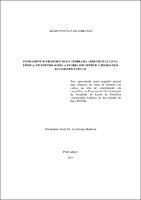| Share record |


|
Please use this identifier to cite or link to this item:
https://tede2.pucrs.br/tede2/handle/tede/2145Full metadata record
| DC Field | Value | Language |
|---|---|---|
| dc.creator | Bez, Alessandra da Silveira | - |
| dc.creator.Lattes | http://lattes.cnpq.br/0538742795979366 | por |
| dc.contributor.advisor1 | Barbisan, Leci Borges | - |
| dc.contributor.advisor1Lattes | http://buscatextual.cnpq.br/buscatextual/visualizacv.do?id=K4799795D1 | por |
| dc.date.accessioned | 2015-04-14T13:39:08Z | - |
| dc.date.available | 2014-04-08 | - |
| dc.date.issued | 2014-01-06 | - |
| dc.identifier.citation | BEZ, Alessandra da Silveira. Fundamentos filosóficos da teoria da argumentação na língua : um estudo sobre a teoria dos topoi e a teoria dos blocos semânticos. 2014. 244 f. Tese (Doutorado em Letras) - Pontifícia Universidade Católica do Rio Grande do Sul, Porto Alegre, 2014. | por |
| dc.identifier.uri | http://tede2.pucrs.br/tede2/handle/tede/2145 | - |
| dc.description.resumo | Teoria da Argumentação na Língua: é a partir da língua que o locutor é capaz de argumentar. Esse argumentar, que busca o sentido no intralinguístico, constitui a tese defendida pela teoria semântico-argumentativa desenvolvida por Oswald Ducrot, Marion Carel, Jean-Claude Anscombre e colaboradores, desde meados da década de 1970, ancorada por suas bases filosóficas, ou seja, por suas hipóteses externas, e realizada por suas hipóteses internas, ou seja, por suas ferramentas linguísticas. Esse novo olhar sobre a língua e seu uso é uma resposta à lógica e à argumentação retórica que buscam a semantização na realidade e nas condições de verdade e de falsidade. O objetivo principal deste trabalho não é fazer uma comparação entre a Teoria da Argumentação na Língua e a lógica, mas é mostrar como a própria Teoria da Argumentação na Língua apresentou, em sua Teoria dos Topoi, recursos lógicos e extralinguísticos, afastando-se de suas hipóteses externas, e como a Teoria dos Blocos Semânticos resgatou esse estatuto intralinguístico, radicalizando essas mesmas hipóteses externas. A metodologia deste trabalho contempla uma análise crítico-reflexiva sobre a Teoria dos Topoi e a Teoria dos Blocos Semânticos a partir das hipóteses externas da Teoria da Argumentação na Língua. Dessa forma, o presente estudo procura mostrar que o sentido não é estabelecido a partir da passagem do argumento para a conclusão, como propõe a Teoria dos Topoi, mas a partir da relação entre dois segmentos capaz de constituir outro sentido, como propõe a Teoria dos Blocos Semânticos, evidenciando todo o entrelaçamento argumentativo e a tessitura semântica da Teoria da Argumentação na Língua. | por |
| dc.description.abstract | Theory of Argumentation within Language: it is from the language that the speaker is able to argue. This argue , which searches for the meaning in the intralinguistic, constitutes the thesis supported by the semantic-argumentative theory, developed by Oswald Ducrot, Marion Carel, Jean-Claude Anscombre and collaborators, since the middle of the 1970s, established in its external hypotheses, i.e., by its philosophical bases, and accomplished by its internal hypotheses, i.e., by its linguistic tools. This new view about language and its use is an answer to the logic and to the rhetorical argumentation that search for the semantization in reality and in the truth and falsity conditions. The main goal of this thesis is not to make a comparison between the TAL and logics, but it is to show how the Theory of Argumentation within Language itself introduced, in its Theory of Topoi, logical and extralinguistic resources, leaving its external hypotheses, and how the Theory of Semantic Blocks rescued this intralinguistic statute, radicalizing these same external hypotheses. The method of this study is a critical-reflexive analysis about the Theory of Topoi and the Theory of Semantic Blocks from the external hypotheses of the Theory of Argumentation within Language. Therefore, the current study seeks for showing that meaning is not established in the passage from argument to conclusion, as the Theory of Topoi proposes, but from the relation between two segments able to constitute another meaning, as the Theory of Semantic Blocks proposes, putting in evidence the whole argumentative entanglement and the semantic embracement of the Theory Argumentation within Language. | eng |
| dc.description.provenance | Made available in DSpace on 2015-04-14T13:39:08Z (GMT). No. of bitstreams: 1 456584.pdf: 7165778 bytes, checksum: 630325a5a71d44653b773d7b1ab8b785 (MD5) Previous issue date: 2014-01-06 | eng |
| dc.format | application/pdf | por |
| dc.thumbnail.url | http://tede2.pucrs.br:80/tede2/retrieve/9736/456584.pdf.jpg | * |
| dc.language | por | por |
| dc.publisher | Pontifícia Universidade Católica do Rio Grande do Sul | por |
| dc.publisher.department | Faculdade de Letras | por |
| dc.publisher.country | BR | por |
| dc.publisher.initials | PUCRS | por |
| dc.publisher.program | Programa de Pós-Graduação em Letras | por |
| dc.rights | Acesso Aberto | por |
| dc.subject | LINGUÍSTICA | por |
| dc.subject | ARGUMENTAÇÃO | por |
| dc.subject | SEMÂNTICA | por |
| dc.subject.cnpq | CNPQ::LINGUISTICA, LETRAS E ARTES::LETRAS | por |
| dc.title | Fundamentos filosóficos da teoria da argumentação na língua : um estudo sobre a teoria dos topoi e a teoria dos blocos semânticos | por |
| dc.type | Tese | por |
| Appears in Collections: | Programa de Pós-Graduação em Letras | |
Files in This Item:
| File | Description | Size | Format | |
|---|---|---|---|---|
| 456584.pdf | Texto Completo | 7 MB | Adobe PDF |  Download/Open Preview |
Items in DSpace are protected by copyright, with all rights reserved, unless otherwise indicated.




